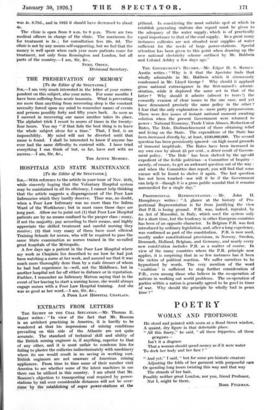EXTRACTS FROM LETTERS
THE SECRET OF THE COAL SITUATION.—Mr. Thomas E. Slater writes : "In view of the fact that Mr. Bossom is an architect practising in America, it is hardly to be wondered at that his impressions of mining conditions prevailing on this side of the Atlantic are not quite accurate. The standard of technical skill and ability of the British mining engineer is, if anything, superior to that of any other, and it is most unfair to condemn him for failing to plaster the collieries indiscriminately with machinery where its use would result in no saving in working cost. British engineers are not unaware of American mining appliances. From time to time some of their number visit America to see whether some of the latest machines in use there can be utilized in this country. I am afraid that Mr. Etossom's objection to transporting coal required by power- stations by rail over considerable distances will not be over- Dame by the establishing of super power stations at the pithead. In considering the most suitable spot at which to establish generating stations due regard must be given to the adequacy of the water supply, which is of practically equal importance to that of the coal supply. In a great many instances collieries are not situated near supplies of water sufficient for the needs of large power-stations. Special attention has been given to this point when drawing up the new national electricity scheme outlined by Mr. Baldwin and Colonel Ashley a few days ago."
THE GovERN3tEmes RECORD.—Mr. Edgar H. S. Barnes- Austin writes : "Why is it that the Spectator finds that wholly admirable in Mr. Baldwin which it strenuously condemned in Mr. Lloyd George ? Why should it applaud gross national extravagance in the first-named's admini- stration, while it deplored the same act in that of the latter ? Why should it admire (almost to tears !) the cowardly evasion of clear issues in the one case, and yet have denounced precisely the same policy in the other ? I fear that the only explanation is—mere party prepossession. There were- five issues of instant national moment awaiting solution when the present Government were returned to power : National Economy, Trade Union Abuses, Reduction of Rates, The Dole, Disfranchisement of those obtaining relief and living on the State. The expenditure of the State has been increased directly by, at least, 1100,000,000. The second question has been persistently ignored—on high moral grounds of immoral ineptitude. The Rates have been increased in my own case by about 25 per cent., a direct result of Govern- ment policy. 'The Dole' has been shelved by the age-old expedient of the feeble politician—a Committee of Inquiry—. merely, of course, to get an awkward question out of the way ; and when the Committee does report, you will find that some excuse will be found to shelve it again. The last question has not been touched—nor will it be if the Government can help it—though it is a gross public scandal that it remains unremedied for a single day."
PROPORTIONAL REPRESENTATION. — Mr. John IL Humphreys writes : "A glance at the history of Pro- portional Representation is far from justifying the view that P.R. is losing ground. P.R. was, indeed, repealed, by an Act of Mussolini, in Italy, which used the system only for a short time, but the tendency in other European countries has been of an opposite character. In Belgium P.R. was first introduced by ordinary legislation, and, after a long experience, was confirmed as part of the constitution. P.R. is now used, mostly under constitutional provisions, in Norway, Sweden, Denmark, Holland, Belgium, and Germany, and nearly every new constitution includes P.R. as a matter of course. In view of the many countries where the P.R. principle now applies, it is surprising that in so few instances has it been the victim of political reaction. We suffer ourselves to be hypnotized by words. The very mention of the word ' coalition ' is sufficient to stop further consideration of P.R., even among those who believe in the co-operation of nations in working out world problems. The co-operation of parties within a nation is generally agreed to be good in times of war. Why should the principle be wholly bad in peace time ?"


















































 Previous page
Previous page